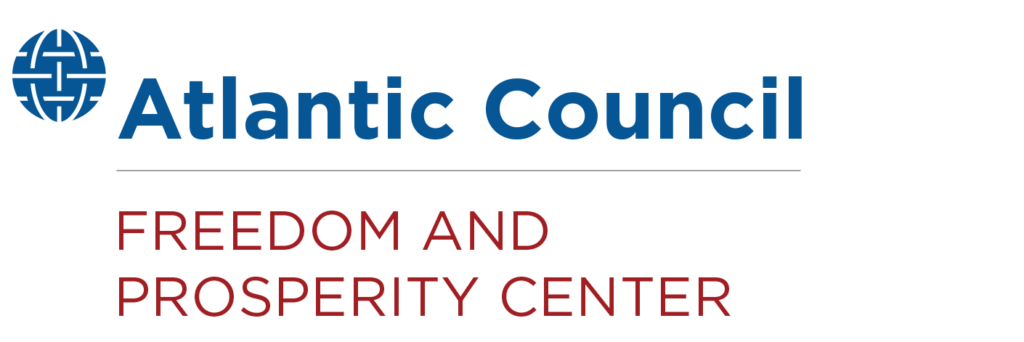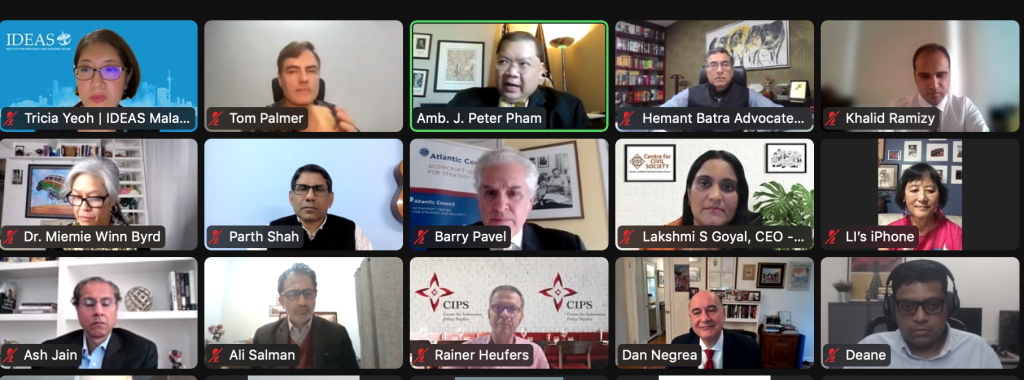On February 16, 2022, the Atlantic Council’s Freedom and Prosperity Project, in collaboration with the Centre for Civil Society in India, hosts the fourth and last in a series of virtual workshops on strengthening economic freedom, rule of law, and representative government in different regions across the world.
This workshop focuses on Asia and convenes a small group of former senior officials, civil society leaders, and scholars from across the region and from the United States to discuss the credibility of the project’s message and how to communicate it to stakeholders in the region.
Here are the key takeaways:
Why the message is needed
East and Southeast Asia are experiencing significant debate about the state’s role in a post-pandemic economic recovery, and many want the state to assume a greater role in governance and the promotion of economic transformation. The pandemic has increased popular skepticism around liberal democratic values and institutions. Supply chain issues and food insecurity have inspired a greater desire for economic protectionism, and the general sense of instability surrounding the Covid-19 crisis has led to greater acceptance for authoritarian governments, which are seen as more stable and protective. Simultaneously, there has been an erosion of trust in representative democracy—people are willing to accept new laws that diminish their civil liberties if they promise greater stability. These post-pandemic conditions make it difficult for think tanks to push for liberalization and openness.
The West’s ability to equate freedom with prosperity was an important strength in the Cold War; however, due to perceived flaws in Western democracies today, this equation no longer seems clear to many Asian audiences. As populations become more disillusioned with democracy, China’s growing influence in the region and the spread of Chinese investment and culture have led many regional leaders to cite Beijing as an attractive model.
The implications of getting the freedom and prosperity message right in Asia are significant. Messaging in Asia resonates far beyond the Indo-Pacific, with broader consequences and strategic impact. For example, African leaders often cite Asian countries as their models, giving the decisions of Asian countries added weight. Countries around the world will be watching to see how debate about the role of the state in East and South Asia plays out.
Framing the Message
There have been successes and failures in promoting messages around freedom and prosperity in Asia. Many countries are eager to join international free trade agreements but are skeptical of economic liberalization at home, and international statements in defense of democracy often co-exist with domestic political repression.
First and foremost, messengers should tailor their arguments to their listeners. Many countries in Asia continue to experience significant societal cleavages based on race, religion, and identity, and arguments based on ideology are often discounted in favor of identity-based arguments. Effective messaging must embrace local cultural, religious, or philosophical frameworks. Emphasizing the three freedoms within the context of religion in Muslim societies, for example, may increase local receptiveness.
Messengers should also draw on history to communicate the need for greater freedoms. Many Asian countries have experienced communism, Islamic autocracies, and authoritarianism at various periods in their existence. Unlike some Western populations, these Asian societies have a recent memory of living without basic freedoms that can shape their wariness of authoritarianism today.
Messaging about economic freedom, rule of law, and representative government will be most effective if publics understand the direct impact of these structures on their lives. Accompanying graphs and charts with case studies, anecdotes, images, and simple infographics will make complex ideas more relatable. Those who experience short-term pain in the name of free markets — such as the removal of subsidies—need to hear about the long-term benefits of policy decisions on their lives, such as the amount of money they will save in taxes from ending subsidies.
Messengers should market their arguments to elite audiences as well. Many liberal thinkers and politicians in the region promote only some types of freedom; those who advocate for rule of law may not support economic openness, and vice versa. Elites must be convinced that increased freedoms across all domains will result in a more prosperous society. Potential steps include packaging clear talking points for politicians and providing impactful data to journalists to demonstrate the benefits of increased freedoms.
Effective messaging should also consider the gradient between free market and interventionist systems. Messengers should be cautious about always dismissing state interventions as ineffective—East Asia is currently seeing the rapid reinvention of managed economies, providing a number of strong models that promote freedom while addressing inequality. Messengers should emphasize that a strong state is not necessarily off the table, so long as it is accompanied by societal freedoms that help the private sector and spur long-term investment.
Finally, messaging derives its credibility from the credibility of the messenger. Many messengers around the world, and particularly in Asia, are better positioned to deliver this message than those in the West. India has enormous credibility as a democratic messenger but often does not realize its full potential. Other Asian countries also have a role to play in their own region and beyond. Western partners should understand when it may be most effective to step back and allow Asian messengers to take the lead.
What can be done
Messaging about the benefits of freedom and democracy must be accompanied by real action. The credibility of this message is tied to its demonstrated benefits, and publics will be unlikely to support democratic systems if they do not see a tangible positive impact on their lives. Established democracies need to demonstrate that they can deliver steady growth by reducing inequality at home and ensuring the widespread distribution of benefits and opportunity across society.
Western democracies also need to make reforms at home to improve the credibility of messaging abroad. Leaders should consider what changes will make the liberal democratic model even more credible, particularly in the face of growing competition from the “China model” across Asia.
For media inquiries, please contact press@atlanticcouncil.org.
Driven by our mission of “shaping the global future together,” the Atlantic Council is a nonpartisan organization that galvanizes US leadership and engagement in the world, in partnership with allies and partners, to shape solutions to global challenges.

The Freedom and Prosperity Center aims to increase the prosperity of the poor and marginalized in developing countries and to explore the nature of the relationship between freedom and prosperity in both developing and developed nations.
